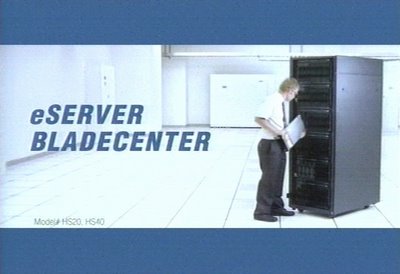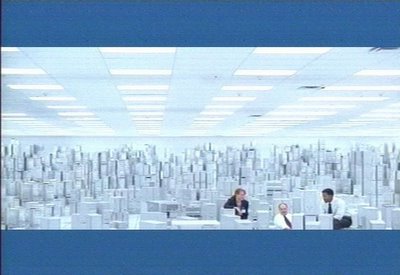Monday, January 30, 2006
Sunday, January 29, 2006
The Ricky Gervais Show
By
A.H. Rajani
at
1/29/2006 07:00:00 PM
5
Comments
![]()
Update: SENIOROPOLY
By
A.H. Rajani
at
1/29/2006 06:35:00 PM
0
Comments
![]()
Saturday, January 28, 2006
Freshly-Cut: Albums of the Month
- Cat Power / "The Greatest" (2006)
- Joy Division / "Unknown Pleasures" (1979)
- Temple of the Dog / "Temple of the Dog" (1991)
- David Gray / "White Ladder" (2000)
- Brokeback Mountain / "Original Motion Picture Soundtrack" (2005)
By
A.H. Rajani
at
1/28/2006 12:19:00 AM
0
Comments
![]()
Thursday, January 26, 2006
Podcast Revolution
[A] term coined in 2004 when the use of RSS syndication technologies became popular for distributing audio content for listening on mobile devices and personal computers. A podcast is a web feed of audio or video files placed on the Internet for anyone to subscribe to. Podcasters' websites also may offer direct download of their files, but the subscription feed of automatically delivered new content is what distinguishes a podcast from a simple download or real-time streaming (see below). . . . Podcasting's essence is about creating content (audio or video) for an audience that wants to listen when they want, where they want, and how they want.
Some podcasts update their listings every few hours (like NPR), others update daily, weekly, or at more random intervals. You can tap into great political coverage, world news coverage, audiobooks, music, comedy shows, and just about anything--all with no or very few advertisements. Most podcasts are free, but some require payment.
By
A.H. Rajani
at
1/26/2006 08:48:00 PM
0
Comments
![]()
Wednesday, January 25, 2006
Saga of the Registrar
By
A.H. Rajani
at
1/25/2006 02:51:00 PM
0
Comments
![]()
Tuesday, January 24, 2006
Beyond Hegira
I started this blog a few months ago and it is the first non-academic writing I've done in a long time. I used to write a lot in the mid-1990's. I wrote, painted, sketched, colored. This was mostly up until high school. I just stopped writing around the beginning of my senior year, though I did take an art class that year where I finished a few projects on religious imagery. I also painted a mural for my high school which depressed the hell out of people. Maybe that's a good place to begin . . . or, maybe, exactly a year before that.
1999:
During the previous two years of high school, I had sat back and let other students paint the mural on behalf of my class. We did not win either year. I was fine with it probably because I was mostly uninterested with the event. But in my junior year, some committee who organizes the event asked me to paint the mural (because I was always known as a good artist). My condition was that I get full control and that I wanted a good friend, Adam Schwartz, to work with me. Adam knew more about mixing paints and brush techniques than I did. In fact, Adam has since graduated from a good art school in NY and does some digital design work. Anway, I gave my conditions; the only condition I had in return was that the committe could pick the "theme" of the mural. I said OK.
So I was saddled with "Animal Kingdom" for my theme. That's a pretty shitty theme, but not so shitty so as to be unworkable. I'll spare you the details of the actual process, but I kept most of the ideas a complete secret, with Adam and I being the only ones working on the project. I had a general idea for it and Adam chimed in with some good ideas, back and forth we went, building the foundation of my folklore.
Now keep in mind this event is a happy event. Previous murals had peace symbols and such nonsense as flowers and random hideousness that most high school students prefer. But you know me, I can't help myself. I wish I had a picture of the mural to show you
You can imagine that most people found it off-putting. A few yelled at me or Adam or both of us, but nothing out of hand. One or two people didn't want it displayed at all. But others interpreted it as a kind of political message about the environment--one that I myself didn't really think of consciously while painting. So it was a mixed reaction. We won the competition.
Then comes my senior year. People knew they couldn't really trust Adam or me in terms of subject matte because of what happened the year before. But we won, so they offered Adam and I the position again, though I was surprised that they didn't want more oversight over the project. The same bargain, only this time we were afflicted with the theme, "SENIOROPOLY." That's right folks: SENIOROPOLY. Apparently the powers-that-be thought this was a good theme. I assume it was a mix between the term Senior and the game Monopoly.
Well, after 2000, I kind of shut down inside--at least in terms of creative writing. I just couldn't paint or draw anymore; it literally hurt to do so. As if tapping into that part of my self where I get ideas and inspiration was emptying me out. Of course, I had a lot of academic writing during my four years at Syracuse University. I was churning out critical theory papers like nobody's business. Two papers a week, I became an analytical monster.
By
A.H. Rajani
at
1/24/2006 12:20:00 AM
0
Comments
![]()
Sunday, January 22, 2006
A Brief Foray Into Telecommunications
By
A.H. Rajani
at
1/22/2006 11:44:00 PM
6
Comments
![]()
Saturday, January 21, 2006
Freshly-Cut: Albums of the Month
(December 2005)
- Clap Your Hands and Say Yeah! / "Clap Your Hands and Say Yeah!"
- Johann Johannsson / "Dis"
- Hooverphonic / "A New Stereophonic Sound Spectacular"
- The Strokes / "First Impressions of Earth"
- The Fray / "She Is"
- Elliot Smith / "Xo"
By
A.H. Rajani
at
1/21/2006 04:43:00 PM
0
Comments
![]()
Sunday, January 15, 2006
IBM Gone Wild

I can see it now. Two years from now, IBM will have a new ad campaign depicting graveyards of fridge-sized servers. Apparently Big Blue thinks we've gone mad.
By
A.H. Rajani
at
1/15/2006 01:34:00 PM
3
Comments
![]()
Incoming Transmission
- Finished finals
- Had my mother visit California for the first time
- Rebuilt my computer
- Saw "Brokeback Mountain," "Syriana," and "Munich"
- Went to New York for a week
- Started my Spring semester at Boalt
- Sold my Toyota Camry
- Saw a stunning Colts loss and a satisfying Denver win
New posts will be here soon.
By
A.H. Rajani
at
1/15/2006 01:24:00 PM
0
Comments
![]()





